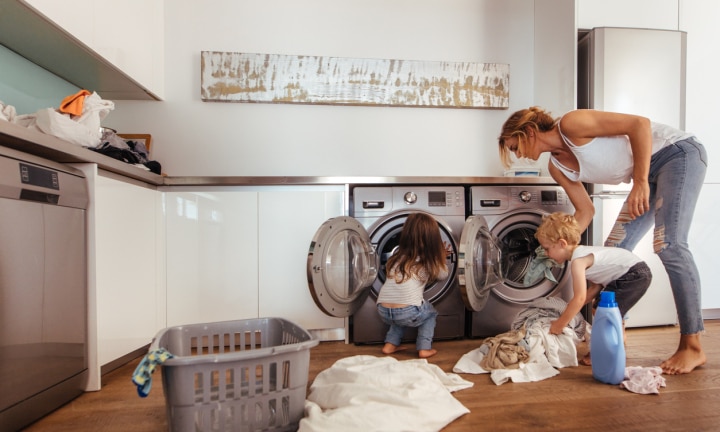Clever ways to conserve energy and keep your electricity bill down this winter
Simple adjustments can make all the difference...
Lifestyle
Don't miss out on the headlines from Lifestyle. Followed categories will be added to My News.
As we keep the heater going and pile on the layers of clothing, there’s one thing we know for sure during the cooler months: our electricity bills skyrocket.
But there are a few tricks we didn’t know that could save you a heap when it comes to your next bill – and it’s all do with the way you use those heaters, dryers and washing machines.
"By choosing energy efficient appliances and following these simple tips around the home, you could help your household save money on energy bills, without compromising on comfort,” Appliances Online’s category expert Colin Jones tells Kidspot.
“With energy consumption at its peak during winter, it is important to have appliances operating efficiently, so as to not require more energy. Simple adjustments can make all the difference not only to your bills but can also save you time.”
Here are a few of Colin’s life-changers and penny savers…
Want to join the family? Sign up to our Kidspot newsletter for more stories like this.

RELATED: Short on cash? Here are a few ways to save money this year
When using your washing machine and dryer
First up, it’s good to know that heat pump dryers are very economical on energy consumption and are highly efficient machines. The heat pump technology recycles hot air back into the dryer and most have a high energy star rating. If you intend to use your dryer more often, this will save you a lot on energy consumption.
But if you’re not planning on investing in a new one, consider the following:
Temperature: Washing with cold water uses less energy consumption, however as cold water does not always remove stubborn dirt and stains it is recommended to set cycles at 30 degrees. This temperature is suitable to use for most garments and will also save energy consumption.
Fill it effectively: Both washing machines and dryers are most efficient when used with the correct loads. Newer washing machine models have ‘load sensors’ that detect the size of the load and will only use enough water to wash the amount of garments loaded. Loading your dryer correctly according to garment size and weight means your dryer will take less time drying each load.
Clean the lint out: All dryers should have their filters cleaned after each use. This allows air to pass through efficiently for optimum use. When your lint tray is full of lint particles your dryer needs to work much harder to push heated air through your drying clothes.
When using a heater
Gas and convector heaters are the more energy efficient options, and selecting the correct size heater for the room is also important. A heater that is too small for a large area will not heat up the area properly so you’ll be using the energy with very little reward (and paying for it in your next bill!).
There are also a few things you can do around the home to help conserve energy:
- Cover your windows and doors at night, window coverings such as curtains will assist in keeping the cold out.
- Close doors between rooms not being used to retain heat.
- Consider investing in supplementary items, such as duvet inners for your bedroom and draught stoppers to stop cold air from leaking in.
- Have insulation installed in your roof; your home will be cooler in summer and warmer in winter.
RELATED: Here are a few extra ways you can save money on other bills around the home.

A note about your fridge
Look for the energy star rating when choosing an energy efficient fridge. Newer fridges use the least amount of energy. By moving air around the inside of the fridge and freezer, they provide even freezing and cooling. Larger fridges use up more energy, so make sure to invest in the right size fridge to suit your household.
Other things to consider about your fridge:
Keep it full: Fridges and freezers work by cooling the air inside them, therefore it can pay to have your fridge as full as possible. This ensures less air inside that the fridge needs to work on cooling.
Keep it sealed: Try and keep your fridge as airtight, as possible. Older fridges may need replacement seals around the door, which can be easily done. Also refrain from opening your fridge unless you need something, as the more you open the fridge door, the more cold air will escape. We know, not that easy when you have a toddler who is ‘hangry!’
When using your dishwasher
It’s probably the appliance you use most in a house full of hungry kids, so these tips should help with the next bill:
Fill it effectively: The best thing you can do to conserve energy with a dishwasher is to make sure it is fully loaded before you hit ‘start’. However, avoid ‘overfilling’ as this will mean the dishes won’t come out pristine and you will end up needing to do further cleaning, wasting electricity, water, and time.
Understand the added features: Getting to know your dishwasher’s features can not only mean cleaner dishes, but also more efficient usage. Some come with options like ‘eco-load’ or ‘half-load’, which make for more efficient cycle options. Try using the rinse or pre-wash cycle of your dishwasher, instead of rinsing your plates under the running tap. Using a good detergent will also assist with your wash results and drying cycle.

RELATED: How to convince your child to dress warm this winter
When using your oven and cooktop
Now is a good time to point out that induction cooktops are considerably more energy efficient than standard electric cooktops. But the following cooking tips will also assist with energy consumption in the kitchen:
- When using frozen foods, thaw fully before cooking to save time and energy.
- Cooking your vegetables with steam uses less energy than boiling.
- Select the correct pan or pot size for your hotplates and cook with the lid on.
- Use the minimum amount of water in your pot and bring the liquid to the boil quickly on a high setting before turning the heat down.
- Use your kettle (or instant boiling water tap) to boil water, rather than the stove.
This article was first published in June 2019 and was updated April 2023.
More Coverage
Originally published as Clever ways to conserve energy and keep your electricity bill down this winter









